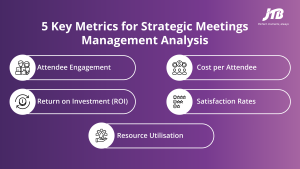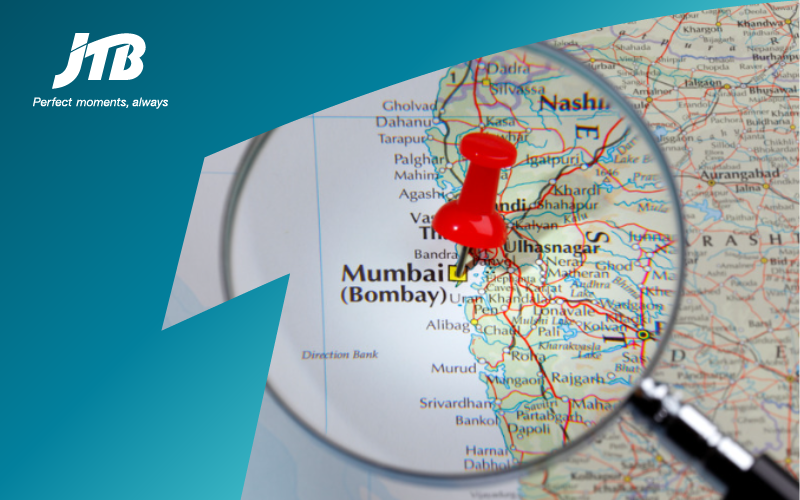Data analytics in SMM plays a crucial role in optimising meeting outcomes and enhancing overall efficiency. At JTB India, our Strategic Meetings Management (SMM) leverages data analytics to enhance service quality and achieve cost savings. By analysing meeting data comprehensively, organisations can make informed decisions that drive success and streamline operations.
Data analytics empowers organisations to evaluate and report on key metrics, such as budget versus actual expenses. This analysis identifies areas for improvement and ensures transparency in financial management. Moreover, it enables stakeholders to review event success against objectives, providing actionable insights for future strategies.
Effective utilisation of data analytics tools enables organisations to collect and interpret meeting data accurately. These tools facilitate the application of predictive analytics to forecast future needs, allowing proactive decision-making. By implementing best practices for data privacy and security, organisations uphold integrity and trust in handling sensitive information.
Integrating data analytics into SMM processes transforms how organisations manage meetings. It empowers them to drive informed decisions, optimise resources, and enhance overall meeting outcomes. Throughout this blog, we will delve deeper into key metrics, tools, and best practices that highlight the transformative impact of data analytics in strategic meetings management.
Key Metrics for Analysis in Strategic Meetings Management
In strategic meetings management (SMM), analysing crucial metrics through data analytics in SMM is vital for enhancing event outcomes and efficiency. By focusing on these essential metrics, organisations can make informed decisions to optimise resources and improve overall effectiveness.
1. Attendee Engagement
Tracking participation rates, feedback scores, and interaction levels during events provide insights into attendee engagement. This metric helps organisers understand how well participants are involved, contributing to better event planning and execution. Additionally, a significant majority—over 82% of B2B marketers identify attendee engagement as a crucial key performance indicator (KPI) for assessing the overall impact of an event.
2. Cost per Attendee
Calculating the total cost divided by the number of attendees evaluates budget efficiency. This metric allows you to save your resources by letting organisations assess the financial effectiveness of meetings, ensuring resources are allocated optimally to achieve desired outcomes.
3. Return on Investment (ROI)
Measuring the financial return relative to the event’s cost assesses overall value. ROI analysis helps organisations determine the success of their meetings in achieving strategic objectives and justifying investments in SMM initiatives. Time-to-time reports can be generated to determine the spending and savings of the corporation.
4. Satisfaction Rates
Using surveys and feedback forms to gauge attendee satisfaction provides valuable insights. This metric identifies strengths and areas for improvement, guiding future event planning to enhance participant experience and satisfaction.
5. Resource Utilisation
Analysing the effectiveness of resources such as venues, technology, and personnel during events ensures optimal utilisation. This metric helps in identifying inefficiencies and optimising resource allocation for improved cost management and operational efficiency.
Leveraging data analytics to monitor these key metrics empowers organisations to enhance strategic meetings management. It enables them to make informed decisions, improve efficiency, and drive better outcomes from their events.
Initial Planning: Using Data Analytics
When embarking on strategic meetings management (SMM), leveraging data analytics from the outset is crucial for shaping successful events. Data analytics empowers organisations to define clear objectives, create accurate budgets, and set realistic timelines based on historical insights. At JTB India, our SMM services are renowned for integrating advanced data analytics to ensure every event is meticulously planned and executed.
- Defining Event Objectives: By analysing historical trends and attendee preferences, data analytics helps in defining clear and achievable event objectives. This approach ensures events are strategically aligned with organisational goals, maximising their impact and relevance.
- Creating Budgets: Data-driven insights assist in creating precise budgets by forecasting expenses derived from previous event data. This method promotes financial transparency and efficiency, enabling optimal resource allocation while maintaining high event standards.
- Scheduling Timelines: Analysis of past event timelines enables the establishment of realistic schedules for planning phases. Understanding critical milestones and lead times facilitates streamlined operations, risk mitigation, and punctual event execution.
Integrating data analytics into initial event planning enhances decision-making precision and operational efficiency. It empowers organisations to strategically align their events, optimise financial resources, and execute timelines effectively, ensuring successful outcomes from start to finish.
Tools for Data Collection and Interpretation
Selecting the right tools for data analytics is pivotal in strategic meetings management (SMM) to optimise event planning and decision-making. These technologies empower organisations to gather comprehensive insights, enhance attendee experiences, and ensure efficient event execution. At JTB India, we integrate cutting-edge tools to elevate event management through informed data utilisation.
- JTB Connect: Our proprietary event management platform, JTB Connect, centralises data collection, enhances visibility into attendee engagement metrics, and ensures compliance throughout the event lifecycle. It integrates seamlessly with other systems to provide a holistic view of event performance.
- Survey Tools: Platforms like Google Forms, Jotform, Qualtrics, etc. are instrumental in gathering structured feedback from attendees. These tools enable organisers to assess satisfaction levels, identify areas for improvement, and make real-time adjustments to event strategies based on participant feedback.
- Analytics Software: Tools such as Google Analytics, HubSpot, Zoho Pagesense, Heatmap etc. offer deep insights into website traffic patterns, registration page interactions, and attendee engagement metrics. This data helps refine marketing strategies, optimise digital presence, and tailor event content to meet participant expectations effectively.
- CRM Systems: Integrating robust CRM systems like Zoho, HubSpot, Salesforce, etc. allows organisations to track attendee interactions and preferences over time. This integration enhances personalization efforts, strengthens attendee relationships, and supports targeted outreach strategies for future events based on historical data insights.
Leveraging advanced tools for data collection and interpretation in SMM not only enhances event management capabilities but also improves decision-making accuracy and attendee satisfaction. As technology continues to evolve, adopting these tools becomes increasingly essential for staying competitive and delivering exceptional event experiences.
A report by Grand View Research estimated the global event management software market to be valued at USD 6.97 billion in 2022. The market is projected to expand at a compound annual growth rate (CAGR) of 12.5% from 2023 to 2030. For deeper insights into leveraging technology effectively in strategic meetings management, explore related content available on our website.
Event Program Optimisation
Using data analytics in SMM to optimise the event program is crucial for enhancing attendee engagement and satisfaction. By leveraging attendee preferences and feedback, organisations can tailor event programs to maximise participant interaction and overall event success. At JTB India, we specialise in crafting personalised event programs through effective data analytics.
1. Real-time Evaluation and Comprehensive Reporting
Data analytics enables comprehensive evaluation of event success, budget analysis, and identification of areas for improvement. Post-event evaluation is critical for the continuous enhancement of event strategies and attendee experiences. At JTB India, our SMM services include thorough evaluation and reporting processes to extract actionable insights and refine future event planning efforts.
2. Application of Predictive Analytics to Forecast Future Needs
Predictive analytics plays a pivotal role in forecasting future meeting needs and trends. By analysing historical data and patterns, organisations can predict attendee preferences, anticipate resource requirements, and enhance event planning efficiency. Real-world case studies demonstrate how predictive analytics has significantly improved meeting outcomes across various industries. JTB India excels in leveraging predictive analytics to optimise every facet of event planning and execution, ensuring seamless and successful events.
Integrating data analytics into SMM processes not only enhances event program effectiveness but also drives informed decision-making and continuous improvement. By leveraging predictive analytics and robust evaluation practices, organisations can ensure impactful and successful events that meet strategic objectives and exceed attendee expectations.
Best Practices for Ensuring Data Privacy and Security
The benefits of strategic meetings management are numerous, but safeguarding data privacy and security is crucial for maintaining trust and confidentiality. Implementing best practices ensures robust protection of sensitive information throughout its lifecycle.
- Data Encryption: Encrypt all sensitive data, both in transit and at rest, to prevent unauthorised access and protect against data breaches. Encryption transforms data into an unreadable format, ensuring its security even if intercepted.
- Access Control: Implement strict access controls to limit access to sensitive information to authorised personnel only. This reduces the risk of data exposure and unauthorised use within organisational systems.
- Regular Security Audits: Conduct periodic security audits to identify and address potential vulnerabilities in data handling practices. Regular assessments strengthen defences against evolving cyber threats and ensure compliance with industry standards.
- Compliance with Regulations: Adhere to stringent data protection regulations such as GDPR or CCPA to ensure data handling practices meet legal requirements. This safeguards individuals’ privacy rights and mitigates risks associated with non-compliance.
- Employee Training: Provide ongoing training on data privacy and security best practices for all staff. Educating employees reduces human error in data handling, enhances organisational security, and promotes a vigilant approach to data protection. Refresher training with practical knowledge assessments helps to achieve organizational objectives.
JTB India upholds these best practices to rigorously protect client data and maintain the highest standards of data privacy and security in SMM. According to IBM Security, data breaches cost an average of $4.45 million per incident, highlighting the importance of robust data security measures.
Conclusion
Data analytics significantly transforms strategic meetings management (SMM), offering powerful tools to optimise event processes and achieve successful outcomes. Leveraging specialised software like JTB Connect and Strategic Meetings Management services by JTB India enhances event planning and execution.
By using data analytics, organisations can make informed decisions, improve attendee engagement, and streamline workflows. JTB Connect, our advanced event management platform, centralises data, enhances visibility, and ensures compliance throughout events. Discover firsthand how JTB India can help you maximise your strategic meetings.





















